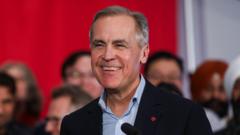In a surprising turn of events, Chrystia Freeland, Canada’s Deputy Prime Minister and finance minister, submitted her resignation on Monday, catching many off guard just hours before she was set to present government plans aimed at enhancing border security with the United States. This development has sparked discussions over the internal dynamics within Prime Minister Justin Trudeau's administration.
Deputy Prime Minister Chrystia Freeland Resigns Amidst Border Security Plans

Deputy Prime Minister Chrystia Freeland Resigns Amidst Border Security Plans
Canada's political landscape shifts as Chrystia Freeland exits cabinet just before a significant announcement.
Freeland's resignation letter revealed tensions between her and Trudeau, suggesting that there had been attempts by him to persuade her to leave her role in the week leading up to her departure. Freeland, who previously played a crucial role in renegotiating the North American Free Trade Agreement during Donald Trump’s presidency, has been a key figure in Canadian politics, especially since she took on the dual role of Deputy Prime Minister and finance minister.
Her abrupt resignation raises questions about the future direction of Canada’s economic policies and its relationship with the U.S. as the country prepares for ongoing discussions on border security. As the story develops, political analysts will closely monitor how this will affect Trudeau’s government stability and its ability to enact crucial policies moving forward.
This situation remains fluid, and further updates are expected as details emerge. Ian Austen, a long-time correspondent for The Times in Ottawa, is following this evolving narrative closely.
Her abrupt resignation raises questions about the future direction of Canada’s economic policies and its relationship with the U.S. as the country prepares for ongoing discussions on border security. As the story develops, political analysts will closely monitor how this will affect Trudeau’s government stability and its ability to enact crucial policies moving forward.
This situation remains fluid, and further updates are expected as details emerge. Ian Austen, a long-time correspondent for The Times in Ottawa, is following this evolving narrative closely.























